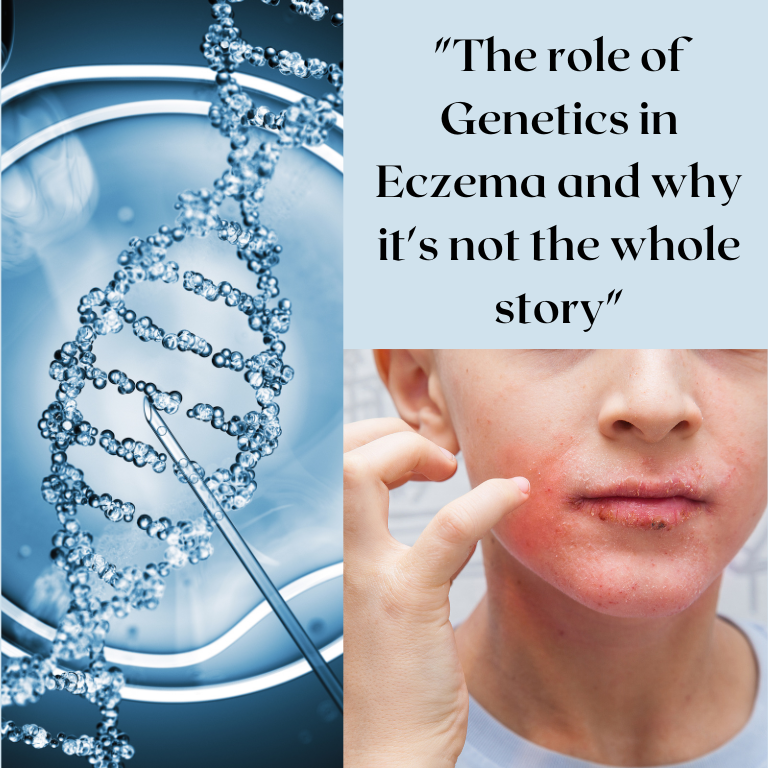
The role of Genetics in Eczema and why it’s not the whole story!
Eczema, also known as atopic dermatitis, is a chronic inflammatory skin condition, a common skin condition characterized by dry, itchy, and inflamed skin. It affects 10-20% of children and 1-3% of adults worldwide.

While there is a Genetic component to Eczema, it is not the whole story!
Research has shown that people with Eczema have a genetic predisposition to the condition, with gene mutations related to skin barrier function, immune system regulation, and inflammation.
For example, mutations in the filaggrin gene, which plays a crucial role in maintaining the skin barrier, are associated with an increased risk of developing Eczema.
However, having these genetic mutations does not mean that someone will necessarily develop Eczema. Environmental factors also play a critical role in triggering and exacerbating the condition. These factors can include irritants like soaps and detergents, allergens like pollen and pet dander, and changes in temperature and humidity.
The complex interaction between genetic and environmental factors means that different individuals may have different triggers or experiences of eczema. For example, one person may develop eczema in response to exposure to specific allergens, while another may develop the condition after experiencing high stress levels.
In addition, the severity and course of eczema can vary widely between individuals, with some people experiencing only mild symptoms that are easily controlled with treatment. In contrast, others may experience chronic, severe symptoms that require ongoing management.
So, while genetics plays a role in Eczema, it is not the whole story. Environmental factors also play a crucial role in triggering and exacerbating the condition, and the interaction between genetics and the environment is complex and not fully understood by the modern medical science.
A comprehensive understanding of Eczema requires considering both genetic and environmental factors.
Role of immunity in Eczema – Does it affect who will develop Eczema?

The immune system plays a significant role in the development of Eczema. Eczema is classified as an autoimmune disorder, meaning that it occurs when the immune system mistakenly attacks healthy cells in the skin, leading to inflammation and other symptoms.
In individuals with Eczema, the immune system is overactive and produces an excessive inflammatory response to triggers such as allergens, irritants, and stress. This chronic inflammation can cause damage to the skin barrier, leading to dry, itchy, and inflamed skin.
Genetic factors also play a role in the immune dysfunction that contributes to Eczema. Many of the genes associated with Eczema are involved in regulating the immune response, including genes that control the production of cytokines, which are signaling molecules that regulate inflammation.
While everyone has some level of immune dysfunction in Eczema, it is not clear why some individuals develop Eczema while others do not.
Again, as mentioned earlier, factors such as environmental exposures, Lifestyle, and stress levels may also play a role in the development of Eczema.
In summary, the immune system plays an important role in the development of Eczema, and immune dysfunction contributes to the chronic inflammation that characterizes the condition.
However, the exact mechanisms is likely that a combination of genetic , Lifestyle and environmental factors is involved in determining who will develop this condition.
Therefore, to manage eczema symptoms effectively, it is essential to consider a holistic approach to wellness. This includes identifying and avoiding environmental triggers, adopting a healthy and anti-inflammatory diet, practicing stress reduction techniques, and getting enough sleep and exercise. By addressing these factors, individuals can reduce inflammation, strengthen the immune system, and improve overall skin health. So, it’s not just genetics that you should focus on when dealing with Eczema, but rather, a more comprehensive approach to wellness that can help manage symptoms and improve quality of life.
What Environmental factors Could be responsible?

There are several environmental factors that can trigger or exacerbate Eczema, including:
- Allergens: Allergens are substances that can trigger an allergic reaction in some people. Common allergens that can trigger Eczema include pollen, pet dander, dust mites, and mold.
- Irritants: Irritants are substances that can cause skin irritation and trigger eczema. Common irritants include soaps, detergents, harsh cleaning products, and certain fabrics.
- Temperature and humidity: Changes in temperature and humidity can also trigger Eczema. For example, exposure to hot weather, low humidity, or cold temperatures can dry out the skin and cause eczema flare-ups.
- Stress: Emotional stress and anxiety can trigger Eczema in some people. Stress can also exacerbate existing eczema symptoms.
- Infections: Certain infections can trigger or exacerbate Eczema. For example, people with Eczema are more susceptible to skin infections like impetigo and staph infections.
- Food: While food allergies are not a common trigger for Eczema, some people may experience flare-ups after eating certain foods, such as dairy products, eggs, nuts, and soy.
It’s important to note that the specific environmental triggers for Eczema can vary from person to person. Identifying and avoiding these triggers is an essential part of managing eczema symptoms.
In addition to avoiding triggers, people with Eczema can also benefit from using moisturizers, topical creams, and other treatments recommended by their healthcare provider.
What Lifestyle factors Could influence Eczema?

In addition to environmental factors, there are several lifestyle factors that can impact Eczema, including:
- Diet: While no specific diet can cure Eczema, eating a healthy, balanced diet may help manage symptoms. Some people with Eczema may find that certain foods, such as dairy, gluten, or processed foods, trigger their symptoms.
- Exercise: Regular exercise can help reduce stress and improve overall health, which helps manage eczema symptoms. However, excessive sweating during exercise can also trigger eczema flare-ups in some people.
- Sleep: Getting enough sleep is vital for overall health and may also help manage eczema symptoms. Lack of sleep or poor quality sleep can trigger eczema flare-ups in some people.
- Smoking and alcohol use: Smoking and excessive alcohol use can weaken the immune system and trigger eczema flare-ups in some people.
- Skincare routine: Developing a skincare routine that is gentle and moisturizing can help manage eczema symptoms. Using harsh soaps or cleansers and failing to moisturize can dry out the skin and trigger flare-ups.
- Stress management: Stress can trigger eczema flare-ups in some people, so finding effective ways to manage stress, such as practicing relaxation techniques or engaging in enjoyable activities, may help manage symptoms.
It’s important to note that while lifestyle factors can impact Eczema, they are not a substitute for medical treatment. People with Eczema should work with their healthcare provider to develop a comprehensive treatment plan that addresses both Lifestyle and medical interventions.
How can you manage Eczema naturally?

People dealing with Eczema can take several steps to reduce inflammation, strengthen the immune system, and improve overall skin health, including:
- Avoiding triggers: As discussed earlier, identifying and avoiding environmental triggers that can worsen Eczema is important. These can include irritants, allergens, and certain foods.
- Moisturizing: Using moisturizers regularly can help reduce dryness and itchiness, which can exacerbate eczema symptoms. Look for moisturizers that are fragrance and toxic ingredients free, and contain nourishing & skin-protecting ingredients.
- Managing stress: As stress can worsen eczema symptoms, finding effective ways to manage stress, such as meditation or exercise, can be helpful.
- Eating a healthy diet: Eating a healthy, balanced diet can help reduce inflammation and support overall skin health. This can include foods high in antioxidants, such as fruits and vegetables, and omega-3 fatty acids, such as fish and nuts.
- Getting enough sleep: As lack of sleep can worsen eczema symptoms, making sure to get enough sleep and maintaining a regular sleep schedule can be helpful.
- Engaging in regular exercise: Regular exercise can help reduce stress, boost the immune system, and improve overall health, which may in turn help manage eczema symptoms.
Herbs

There are several herbs that have been traditionally used to help manage eczema symptoms, although scientific evidence for their effectiveness is limited. Some of the herbs that have been studied for their potential benefit in Eczema include:
- Aloe vera: Aloe vera has anti-inflammatory properties and may help soothe irritated skin. It can be applied topically in the form of a gel or cream.
- Chamomile: Chamomile has anti-inflammatory and antioxidant properties and may help reduce inflammation and itchiness. It can be applied topically in the form of a cream or taken orally as a tea.
- Calendula: Calendula has anti-inflammatory and antibacterial properties and may help reduce inflammation and promote healing. It can be applied topically in the form of a cream or oil.
- Licorice root: Licorice root has anti-inflammatory and antibacterial properties and may help reduce inflammation and promote healing. It can be applied topically in the form of a cream or taken orally as a supplement.
- St. John’s wort: St. John’s wort has anti-inflammatory and analgesic properties and may help reduce inflammation and pain. It can be applied topically in the form of a cream or taken orally as a supplement.
Homeopathy

Homeopathy is a form of holistic medicine that involves the use of potentised & diluted substances to stimulate the body’s natural healing processes.
Homeopathic remedies are typically individualized to each person’s unique symptoms and constitution, so there is no one-size-fits-all remedy for any condition.
There are several homeopathic remedies that have been traditionally used to manage eczema symptoms.
Some of the commonly used homeopathic remedies for Eczema include:
- Graphites: Graphites is a homeopathic remedy made from graphite, and it is commonly used to manage dry, scaly skin and itching.
- Sulphur: Sulphur is a homeopathic remedy made from sulfur, and it is commonly used to manage skin rashes and itching.
- Rhus toxicodendron: Rhus toxicodendron is a homeopathic remedy made from poison ivy, and it is commonly used to manage skin itching, redness, and blistering.
- Natrum muriaticum: Natrum muriaticum is a homeopathic remedy made from sodium chloride, and it is commonly used to manage dry, itchy skin and skin eruptions.
- Arsenicum album: Arsenicum album is a homeopathic remedy made from arsenic, and it is commonly used to manage skin itching and burning.
It’s important to note that while herbs & homeopathy should always be taken under the guidance of a qualified & experienced practitioner.
In summary, having a family history of eczema may increase an individual’s risk of developing the condition, but it is not a guarantee.
Even individuals without a family history of eczema can develop the condition due to other factors, such as exposure to allergens or irritants. Therefore, it is important to maintain good skin hygiene and care practices, identify and avoid environmental triggers, and seek medical treatment if necessary, regardless of family history.
Protecting your skin is crucial, especially when dealing with chronic skin issues like eczema. It’s important to use gentle and non-irritating products to ensure your skin stays healthy, hydrated, and shielded from damage.
One excellent product to consider is the Naturo Essentials Body Wash, which is specially formulated to be herbal, natural, and gentle. This body wash is a great choice for those with sensitive skin or for those who prefer natural alternatives to conventional body washes.
The Naturo Essentials Body Wash features carefully selected ingredients that nourish and hydrate the skin while also removing impurities and revitalizing it. This body wash is suitable for all skin types, whether dry, oily, or combination, and leaves the skin feeling soft, smooth, and healthy.
Eczema is a complex condition that can have multiple contributing factors. To achieve effective and holistic treatment, I am here to provide support in identifying the underlying causes and developing a comprehensive treatment plan. This may include lifestyle adjustments, topical treatments, and safe and natural remedies to improve your skin health without any negative side effects. For further information, please feel free to contact me at contact@holisticskinwellness.com.
I hope you liked this blog; remember to like, subscribe & share!
